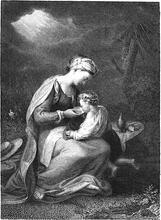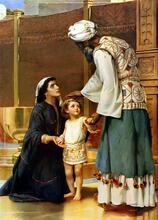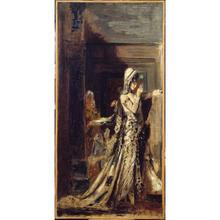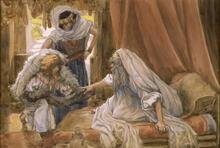Sarah/Sarai: Bible
Many of the story about Sarah (originally named Sarai) in Genesis are about her role as both Abraham’s wife and also perhaps a biological family member; ultimately her ancestry is unclear. During her 127-year life, she is enslaved in Egypt, foreshadowing Israel’s later bondage, and is ultimately released after God sends plagues. Sarah is unable to have children for most of her life and uses Hagar as a surrogate to birth Ishmael, but at 90 years old God blesses her with the birth of Isaac. After securing Isaac’s position in the family as Abraham’s heir, Sarah largely disappears from Genesis, but she is remembered as the ancestress of her people.
Sarah is the wife of Abraham, the mother of Isaac, and thus the ancestress of all Israel. The Bible explains that Sarai was her earlier name and that she was renamed at the annunciation of the birth of Isaac (Gen 17:15).
Ancestry
Sarah’s ancestry is not clear. Genesis 11 relates that Abram and his brother Nahor married Sarai and Milcah, respectively (v. 29). It does not name Sarah’s father, even though it relates that Milcah was the daughter of Haran, Terah’s other son, and then names Haran’s other daughter, Iscah. When Gen 11:31 tells that “Terah took his son Abram and his grandson Lot son of Haran, and his daughter-in-law Sarai, his son Abram’s wife” from Ur to Haran, it does not call Sarai Terah’s granddaughter. However, in Genesis 20, when Abraham explains his wife-sister ruse to Abimelech of Gerar, he claims that Sarah is his non-uterine sister (v. 12). This contradiction has led some readers to identify Sarah with the otherwise unknown Iscah. But this would make Sarai Abram’s niece, not his half-sister; it would not explain why she is identified as daughter-in-law to Terah, not as his daughter.
Sarah and Abraham come to Israel as part of God’s promise of numerous progeny and the land (Gen 12:1–5). Because Sarah’s importance to this promise is not at first obvious, the promise is immediately endangered. Forced by famine to leave the land, Abraham is fearful that Egyptians will kill him in order to take the beautiful Sarah. His concerns make sense in the biblical milieu, for in the Bible, beauty sets up the beautiful to be desired and taken. Indeed, Esther and Judith, at the close of the biblical period, are the first to use their beauty to their people’s advantage. Furthermore, in the ancient world adultery was considered a very grievous offense, possibly even worse than murder. Thus, Abraham’s solution seems bizarre; he asks Sarah to say that she is his sister. They would still take her, but they would not kill Abraham, who would thus “share a wife and save a life.” The ruse might have some advantage for Sarah, for a brother was somewhat of a protector, whereas a widow had no protection of any kind. It certainly enriched Abraham, who was given bride wealth for a sister, something that he would never have received as a husband.
Genesis 12 relates this strange wife-sister episode in a matter-of-fact fashion. Genesis 20, the parallel account in which Abraham tries this ruse in Gerar, adds new details that perhaps show concern about Abraham’s actions that developed after the original telling of the story. The Gerar story emphasizes that Abimelech never touched Sarah because God immediately intervened with dreams. Moreover, the narrator is not at ease with the wife-sister ruse and may no longer understand it. So, Abraham not only relates that Sarah is his half-sister, but also makes it clear that the ruse is done by the grace and benevolence of Sarah.
Enslavement in Egypt and Barrenness
Although the wife-sister stories are difficult to understand, the fact that Sarah becomes a slave in Pharaoh’s house serves to foreshadow Israel’s later bondage in Egypt. She herself is not in danger of her life—but the reader knows that nascent Israel is in danger of losing its ancestress. And so God acts to protect Sarah by afflicting “Pharaoh and his house with great plagues” (Gen 12:17) until he realizes the problem and sends Sarah away. Protection and plague foreshadow Israel’s later redemption at the exodus.
Sarah’s barrenness also endangers the promise and prompts her to give her handmaiden Hagar to Abraham as a surrogate womb (Gen 16:1–2), a custom known also from Mesopotamia. The plan goes awry when the pregnant Hagar no longer acknowledges Sarah’s superiority. Sarah feels displaced and turns her anger on Abraham, declaring, “May the wrong done to me be on you!” and “May the Lord judge between you and me!” (Gen 16:5). Her own experience of servitude in Egypt perhaps has made her feel threatened by the Egyptian Hagar rather than sympathetic to her. Her status as first wife is not invulnerable: she has been given away before, in the wife-sister ruse, and she may now be vulnerable to Hagar, who conceives and will bear Abraham’s heir. Abraham then restores the authority over Hagar to Sarah. However, Hagar’s child Ishmael is never considered part of Sarah’s domain; Abraham has all the authority in the family, and he, rather than Sarah, names Ishmael (compare the stories of Rachel and Leah, who do name the offspring of their surrogates Bilhah and Zilpah).
Birth of Isaac
Abraham seems content to keep Sarah out of the loop and to consider Ishmael the child of the promise. The miracles that God performed for Sarah in Egypt have not taught him her importance. God informs him that, although Ishmael will have his own destiny, the promise—as formalized in God’s covenant—will come through Sarah. God therefore renames her and blesses her when announcing the birth of Isaac (Gen 17:15–21).
Abraham falls on his face, laughing (Gen 17:17) because of their age (he is one hundred years old, and she is ninety) just as Sarah laughs when she hears the second announcement of the birth (Gen 18:11–15). God ignores Abraham’s laughter, but reacts to Sarah’s. After all, Sarah should understand how important she is, for God has already worked miracles for her. Sarah’s importance in God’s scheme means that God will have zero tolerance for skepticism from her.
Sarah’s importance is certainly clear after she sees Ishmael “sporting” (NRSV, “playing”; Hebrew mezahek) at Isaac’s weaning. The Septuagint reads “playing with him” (with Isaac), which has led some readers to suspect abuse. But however innocent this act may have been, it was Isaac named as “the one who plays” who was supposed to be doing it. Sarah therefore intervenes, urging Abraham to send Hagar and Ishmael away. Abraham, who considers Ishmael his son, is reluctant; but God once again emphasizes Sarah’s importance and tells Abraham to do what she says. As a result, Abraham emancipates Hagar and Ishmael and sends them away as freed slaves.
Having secured Isaac’s position in the family, Sarah disappears from Genesis. She plays no role in the near sacrifice of Isaac. She dies at the age of 127 in Hebron (Gen 23:1–2). Abraham buys his first real property in the land of Israel, the Cave of Machpelah, in order to bury her (Gen 23:19). She is mentioned three more times in the Book of Genesis (24:36; 25:10–12). She is remembered in the prophecies of Isaiah 51 (v. 2) as the ancestress of her people.
Biddle, Mark E. “The ‘Endangered Ancestress’ and Blessing for the Nations.” Journal of Biblical Literature 109 (1990): 599–611.
Bledstein, Adrien J. “The Trials of Sarah.” Judaism 30 (Fall 1981): 411–417.
Eichler, Barry. “On Reading Genesis 12:10–20.” In Tehillah Le-Moshe: Biblical and Judaic Studies in Honor of Moshe Greenberg. Winona Lake, Indiana: Eisenbrauns, 1997, 23–38.
Exum, J. Cheryl. “Who’s Afraid of ‘the Endangered Ancestress’?” In The New Literary Criticism and the Hebrew Bible, edited by J. Cheryl Exum and David J. A. Clines. Sheffield, England: Bloomsbury, 91–113.
Schneider. Tammi J. Sarah: Mother of Nations. New York: The Continuum International Publishing Group, 2004.
Schneider Tammi J . "Sarah." In Mothers of Promise: Women in the Book of Genesis. Grand Rapids: Baker, 2008, 19-40.
Trible, Phyllis. “Genesis 22: The Sacrifice of Sarah.” In Not in Heaven: Coherence and Complexity in Biblical Narratives, edited by Jason P. Rosenblatt and Joseph Sitterson, Jr. Bloomington, Indiana University Press, 1984, 92–116.









